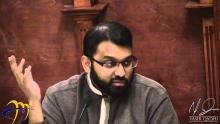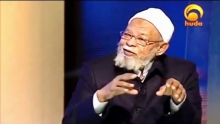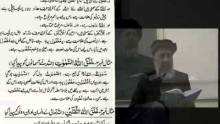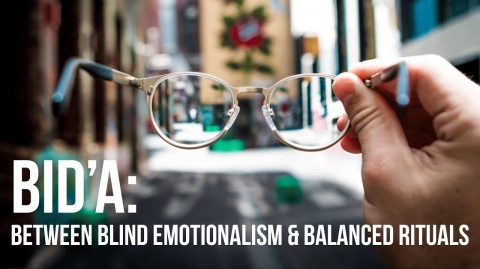A Refutation of Bidah Hasanah (Good Innovation) & The Mawlid - Abu Imran Al-Sharkasi
13 years ago
01:27:08
9,007 views
Linguistically Bid'ah (innovation) means 'a newly invented matter'.
The Sharee'ah definition of Bid'ah is: "A newly invented way [beliefs or action] in the religion, in imitation of the Sharee'ah (prescribed Law), by which nearness to Allaah is sought, [but] not being supported by any authentic proof - neither in its foundations, nor in the manner in which it is performed." Al-I'tisaam of ash-Shaatibee (1/37).
The Prophet (peace and blessings of Allaah be upon him) stated repeatedly that: "Every newly-invented thing is a bid'ah (innovation), every bid'ah is a going astray, and every going astray will be in the Fire." (Reported by al-Nisaa'i in al-Sunan, Salaat al-'Eedayn, Baab kayfa al-Khutbah). Reports with the same meaning were narrated via Jaabir (may Allaah be pleased with him) by Ahmad, via al-'Irbaad ibn Saariyah by Abu Dawud and via Ibn Mas'ood (may Allaah be pleased with him) by Ibn Maajah.
The Prophet (peace and blessings of Allaah be upon him) used to say, when beginning a khutbah (sermon): "... The best of speech is the Book of Allaah and the best of guidance is the guidance of Muhammad. The worst of things are those which are newly-invented, and every innovation is a going astray..." (reported by Muslim, no. 867)
If every bid'ah is a going astray, how can some people then say that there is such a thing in Islam as "bid'ah hasanah"? By Allaah, this is an obvious contradiction of the statement and warning of the Prophet (peace and blessings of Allaah be upon him).
The Prophet (peace and blessings of Allaah be upon him) stated that whoever innovates something new in the deen (religion) will have his deed rejected, and Allaah will not accept it, as is stated in the hadeeth narrated by 'Aa'ishah (may Allaah be pleased with her), who said: "The Messenger of Allaah (peace and blessings of Allaah be upon him) said: 'Whoever innovates something in this matter of ours that is not a part of it will have it rejected.'" (Reported by al-Bukhaari, Fath al-Baari, no. 2697). How can anybody then say that bid'ah is acceptable and it is permitted to follow it?
When a person innovates something and adds to the deen something that does not belong to it, he is implying a number of bad things, each worse than the last, for example:
That the religion is lacking, that Allaah did not complete and perfect it, and that there is room for improvement. This clearly contradicts the statement in the Qur'aan (interpretation of the meaning): "... This day, I have perfected your religion for you, completed My favour upon you, and have chosen for you Islam as your religion..." [al-Maa'idah 5:3]
1. That the religion remained imperfect from the time of the Prophet (peace and blessings of Allaah be upon him) until the time when this innovator came along and completed it with his own ideas.
2. That the Prophet (peace and blessings of Allaah be upon him) was "guilty" of either of two things: either he was ignorant of this "good innovation," or he knew about it but concealed it, thus letting his ummah down by not conveying it. That the Prophet (peace and blessings of Allaah be upon him), his Companions and the righteous salaf (early generations) missed out on the reward of this "good innovation" - until this innovator came along and earned it for himself, despite the fact that he should say to himself, "If it was truly good, they would have been the first to do it."
Opening the door to bid'ah leads to changing the deen (religion) and opens the way for personal whims and opinions, because every innovator implies that what he is introducing is something good.
Following bid'ah leads to the cancelling out of sunnah practices and the ways of the first three generations of Islaam in which the Prophet Muhammad (Sallalaahu Alaihi wa Sallam) described as being the best generations of Muslims. The first, the Prophet (Sallalaahu Alaihi wa Sallam) and his Sahaabah (companions). The second, the Taabi'een (the followers of the companions). The third, the Tabaa'at-Taabi'een (the followers of the followers of the companions).
_______________
ABOUT THE SPEAKER -
Abu Imraan Al-Sharkasi, who was born in Russia into a Muslim family and moved to the UK in 1993.Abu Imran is highly skilled in the Arabic language and has translated extensively at seminars for many scholars and students of knowledge.
He also has tazkiyyah from scholars such as Shaikh 'Abdus-Salaam al-Burgis (raheemaullah), Shaikh Khaalid al-Anbari, Shaikh Fasial al-Jaasim and many others.
Currently Abu Imran is the director of the Al-Burhaan Institute based in Leicester U.K which offers regular beneficial classes throughout the week.
_______________
http://twitter.com/greenlanemasjid
http://www.facebook.com/greenlanemasjid
http://www.glm.tv
http://www.youtube.com/channel/UCgNUOJalS_ciV5VcuSGil3Q?sub_confirmation=1 Like DigitalMimbar on Facebook: http://www.fb.com/TheMimbar
Follow DigitalMimbar on Twitter: http://twitter.com/DigitalMimbar
The Sharee'ah definition of Bid'ah is: "A newly invented way [beliefs or action] in the religion, in imitation of the Sharee'ah (prescribed Law), by which nearness to Allaah is sought, [but] not being supported by any authentic proof - neither in its foundations, nor in the manner in which it is performed." Al-I'tisaam of ash-Shaatibee (1/37).
The Prophet (peace and blessings of Allaah be upon him) stated repeatedly that: "Every newly-invented thing is a bid'ah (innovation), every bid'ah is a going astray, and every going astray will be in the Fire." (Reported by al-Nisaa'i in al-Sunan, Salaat al-'Eedayn, Baab kayfa al-Khutbah). Reports with the same meaning were narrated via Jaabir (may Allaah be pleased with him) by Ahmad, via al-'Irbaad ibn Saariyah by Abu Dawud and via Ibn Mas'ood (may Allaah be pleased with him) by Ibn Maajah.
The Prophet (peace and blessings of Allaah be upon him) used to say, when beginning a khutbah (sermon): "... The best of speech is the Book of Allaah and the best of guidance is the guidance of Muhammad. The worst of things are those which are newly-invented, and every innovation is a going astray..." (reported by Muslim, no. 867)
If every bid'ah is a going astray, how can some people then say that there is such a thing in Islam as "bid'ah hasanah"? By Allaah, this is an obvious contradiction of the statement and warning of the Prophet (peace and blessings of Allaah be upon him).
The Prophet (peace and blessings of Allaah be upon him) stated that whoever innovates something new in the deen (religion) will have his deed rejected, and Allaah will not accept it, as is stated in the hadeeth narrated by 'Aa'ishah (may Allaah be pleased with her), who said: "The Messenger of Allaah (peace and blessings of Allaah be upon him) said: 'Whoever innovates something in this matter of ours that is not a part of it will have it rejected.'" (Reported by al-Bukhaari, Fath al-Baari, no. 2697). How can anybody then say that bid'ah is acceptable and it is permitted to follow it?
When a person innovates something and adds to the deen something that does not belong to it, he is implying a number of bad things, each worse than the last, for example:
That the religion is lacking, that Allaah did not complete and perfect it, and that there is room for improvement. This clearly contradicts the statement in the Qur'aan (interpretation of the meaning): "... This day, I have perfected your religion for you, completed My favour upon you, and have chosen for you Islam as your religion..." [al-Maa'idah 5:3]
1. That the religion remained imperfect from the time of the Prophet (peace and blessings of Allaah be upon him) until the time when this innovator came along and completed it with his own ideas.
2. That the Prophet (peace and blessings of Allaah be upon him) was "guilty" of either of two things: either he was ignorant of this "good innovation," or he knew about it but concealed it, thus letting his ummah down by not conveying it. That the Prophet (peace and blessings of Allaah be upon him), his Companions and the righteous salaf (early generations) missed out on the reward of this "good innovation" - until this innovator came along and earned it for himself, despite the fact that he should say to himself, "If it was truly good, they would have been the first to do it."
Opening the door to bid'ah leads to changing the deen (religion) and opens the way for personal whims and opinions, because every innovator implies that what he is introducing is something good.
Following bid'ah leads to the cancelling out of sunnah practices and the ways of the first three generations of Islaam in which the Prophet Muhammad (Sallalaahu Alaihi wa Sallam) described as being the best generations of Muslims. The first, the Prophet (Sallalaahu Alaihi wa Sallam) and his Sahaabah (companions). The second, the Taabi'een (the followers of the companions). The third, the Tabaa'at-Taabi'een (the followers of the followers of the companions).
_______________
ABOUT THE SPEAKER -
Abu Imraan Al-Sharkasi, who was born in Russia into a Muslim family and moved to the UK in 1993.Abu Imran is highly skilled in the Arabic language and has translated extensively at seminars for many scholars and students of knowledge.
He also has tazkiyyah from scholars such as Shaikh 'Abdus-Salaam al-Burgis (raheemaullah), Shaikh Khaalid al-Anbari, Shaikh Fasial al-Jaasim and many others.
Currently Abu Imran is the director of the Al-Burhaan Institute based in Leicester U.K which offers regular beneficial classes throughout the week.
_______________
http://twitter.com/greenlanemasjid
http://www.facebook.com/greenlanemasjid
http://www.glm.tv
http://www.youtube.com/channel/UCgNUOJalS_ciV5VcuSGil3Q?sub_confirmation=1 Like DigitalMimbar on Facebook: http://www.fb.com/TheMimbar
Follow DigitalMimbar on Twitter: http://twitter.com/DigitalMimbar


 English
English Български
Български No filter
No filter











